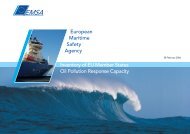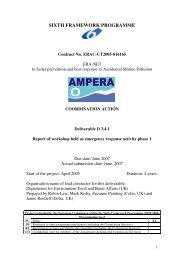Members Handbook 2002 - Centre d'Investigació i ...
Members Handbook 2002 - Centre d'Investigació i ...
Members Handbook 2002 - Centre d'Investigació i ...
You also want an ePaper? Increase the reach of your titles
YUMPU automatically turns print PDFs into web optimized ePapers that Google loves.
20Contingency PlanningA major spill will inevitably presentthose in charge with numerous,complex problems, some of which willbe non-technical in nature. There is agreater likelihood that prompt andeffective response decisions will bemade if considerable effort has beendevoted in advance of any spill to thepreparation of comprehensive, realisticand integrated contingency plans fordifferent levels of risk. Issues which aredifficult to resolve prior to an incidentare likely to become serious conflicts inthe highly charged atmospherefollowing a major spill when everyoneshould be working together, with thecommon purpose of cleaning up thepollution as effectively as possible withthe minimum of damage to theenvironment and economic resources.As well as assessing the particular risksfaced by a facility, region or country,contingency plans should clearly definethe responsibilities of all the differentparties likely to be involved in a spilland the organisational structure foreffective command and control. Thereshould be an up-to-date list of keycontact points. On the technical side,plans should identify sensitiveenvironmental and economicresources, priorities for protection andclean-up, agreed response strategiesfor different sea and shoreline areas atdifferent times of the year, stocks ofclean-up equipment and materials,temporary storage sites and finaldisposal options. Increasingly there isalso a need to plan for managing thelegitimate interests of the media in away that ensures that they receiveregular factual updates, withoutinterfering with the control and conductof the actual response operation.Completed contingency plans maylook impressive but, in reality, the finalproduct is less important than theactual process of planning. Thus, themain benefit of developing a plancomes from gathering all the necessarydata, consulting and getting to know allpotentially interested parties, andresolving potential disputes in a calmatmosphere. For this reason it isimportant that those who will berequired to implement the plan shouldalso be closely involved in itspreparation.Contingency plans should be regularlytested and updated. The ultimate test isa major spill when organisational andtechnical problems will inevitably occur.These problems need to be identified inan objective manner before memoriesfade and interest wanes so thatthey can be addressed throughamendments to the plan.Because actual spills are rare, regulartraining of personnel at all levels andthe testing of equipment is essential.Spill drills and exercises can bevaluable in this regard, so long as theyare not too ambitious and include alarge element of surprise and realism,with all ‘players’ being willing torecognise problems in the final debrief.






